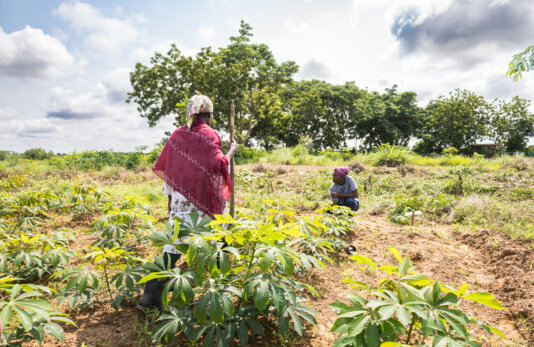- About
- Topics
- Picks
- Audio
- Story
- In-Depth
- Opinion
- News
- Donate
-
Signup for our newsletterOur Editors' Best Picks.Send
Read, Debate: Engage.
| topic: | Sustainable Agriculture |
|---|---|
| tags: | #food security, #biotechnology, #sustaimable agriculture |
| located: | USA, Rwanda, Nigeria |
| by: | Joe Cornelius |
The greatest inventions in history are all born from the spark of discovery. Refining revolutionary discoveries, making them whole and scaling them through collaboration, is what invention truly is. Nowhere is this more urgent and necessary than in global food systems.
By 2050, one in four of the world’s population will be from sub-Saharan Africa. Yet, the yields of African smallholder farmers are currently just a fifth of those in the US. Not only does this create a growing food security gap, but unequal access to agricultural innovation also leaves African smallholder farmers unable to fulfill their potential.
Given smallholder farmers already produce around a third of the continent’s food, the global community’s collective mission must therefore be to leverage scientific and technological advances to improve productivity. This is vital not only for food security but to also benefit African farmers, who are contending with the impacts of climate change, degraded natural resources, biodiversity loss and economic inequity, in addition to rising demand.
To fulfill the promise of agricultural invention, we need a new way of working that unites disparate elements of a vast crop science sector and makes farmers’ needs our starting point, a priority reiterated at this year’s Africa Food Systems Forum. By refocusing and streamlining the process to serve African smallholder farmers, we can deliver demand-led innovation at scale to close the access gap and enable recovery, regeneration, and action.
Recent advances in biotechnology offer new hope in this regard. The convergence of the latest technologies in physical and biological science with data analytics has generated unprecedented potential for breakthrough agricultural transformations that are renewable, affordable and scalable. This cutting-edge science can now package multiple beneficial traits into new crop varieties that increase productivity, decrease costs for the farmer, enhance the environment and support public goods.
Take soils, for example. Over 10,000 years of crop cultivation, agriculture has largely overlooked the selection of crop genetic traits and farm practices that optimise the mutually beneficial relationship between plants, microbes and soils – primarily because this ecosystem was hidden from view underground.
However, a range of new tools are emerging that allow agronomists to understand, measure and manage the physical, biological and chemical properties of soil. Just as patients undergo CT body scans to inform doctors’ diagnoses and treatments, new soil-plant-microbe sensing platforms are beginning to inform scientists, farmers and policy makers.
And with this new level of understanding, breeders can develop improved varieties that benefit from healthy soil interactions to boost crop yield, increase drought resilience, enhance water quality, increase nutrient availability, support biodiversity, and suppress many plant diseases.
New crop varieties developed through biotechnology have already added an estimated USD 261 billion in value over the past 20 years thanks to their greater productivity and efficiency. Farmers in low-income countries receive a fivefold return on investment for each extra dollar spent on improved crop seeds.
These benefits are increasingly recognised by African governments, with Rwanda the latest to approve a biosafety law that paves the way for the introduction of safe and effective biotech crops.
Yet, in some countries, only 10 per cent of farmers have access to the latest generation of seeds or planting material. In Nigeria, an estimated five to 10 per cent of cultivated land is planted with improved seeds despite evident appetite for new varieties. When a new insect-resistant cowpea was released in 2021, the limited supply sold out in fewer than 10 days, indicating Nigerian cowpea farmers are quick to embrace improved seeds when given the opportunity.
Crop innovations too often miss the specific needs and circumstances of Africa’s smallholder farmers, and even when they do respond to the unique challenges that limit small-scale productivity, they struggle to reach the market at the speed and scale needed.
This is where Gates Ag One comes in. We recognise the complexities of developing improved crops and agricultural technologies for smallholder farmers. Publicly-funded research organisations do not always have a viable route to market for their discoveries. At the same time, companies need a clear return on investment before they conduct research and development of food security crops.
Our mission is to act as a catalyst to foster open innovation across public and private sectors and bridge the access gap for the latest agricultural developments. As a non-profit with the agility of a start-up incubator, Gates Ag One partners with local experts, and prospects for early scientific breakthroughs with the potential to benefit smallholder farmers.
We are making long-term investments to provide the security, know-how and commitment needed to steward the research and development process, which is essential for delivering demand-driven, high-impact products.
Delivering agricultural innovations for smallholder farmers requires the skills and talents of many. Gates Ag One was created to help unite those who are breaking new ground so that we can advance quickly, together, towards a more equitable future. Our initial investments include technology development efforts with leading scientists across five continents, from Kenya and Nigeria to Australia and the United States - partnerships that seek to leverage the best science from around the world.
With the full suite of agricultural innovations, smallholder farmers in Africa can be as competitive as those elsewhere. The global crop science sector not only has the means to enable this, but it also has a moral imperative to level the playing field in the interests of all humanity.
Joe Cornelius, Ph.D., is the CEO of Bill & Melinda Gates Agricultural Innovations (Gates Ag One).
Image by Gates Ag One.
